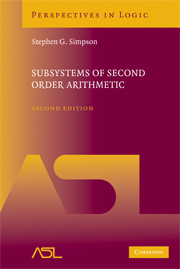PREFACE
Published online by Cambridge University Press: 19 February 2010
Summary
Foundations of mathematics is the study of the most basic concepts and logical structure of mathematics, with an eye to the unity of human knowledge. Among the most basic mathematical concepts are: number, shape, set, function, algorithm, mathematical axiom, mathematical definition, and mathematical proof. Typical questions in foundations of mathematics include: What is a number? What is a shape? What is a set? What is a function? What is an algorithm? What is a mathematical axiom? What is a mathematical definition? What is a mathematical proof? What are the most basic concepts of mathematics? What is the logical structure of mathematics? What are the appropriate axioms for numbers? What are the appropriate axioms for shapes? What are the appropriate axioms for sets? What are the appropriate axioms for functions?
Obviously, foundations of mathematics is a subject of the greatest mathematical and philosophical importance. Beyond this, foundations of mathematics is a rich subject with a long history, going back to Aristotle and Euclid and continuing in the hands of outstanding modern figures such as Descartes, Cauchy, Weierstraβ, Dedekind, Peano, Frege, Russell, Cantor, Hilbert, Brouwer, Weyl, von Neumann, Skolem, Tarski, Heyting, and Gödel. An excellent reference for the modern era in foundations of mathematics is van Heijenoort [272].
In the late 19th and early 20th centuries, virtually all leading mathematicians were intensely interested in foundations of mathematics and spoke and wrote extensively on this subject. Today that is no longer the case. Regrettably, foundations of mathematics is now out of fashion.
- Type
- Chapter
- Information
- Subsystems of Second Order Arithmetic , pp. xiii - xivPublisher: Cambridge University PressPrint publication year: 2009

